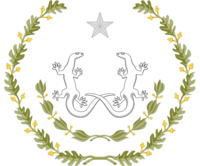Foreign relations of Anáhuac: Difference between revisions
Jump to navigation
Jump to search
No edit summary |
mNo edit summary |
||
| Line 1: | Line 1: | ||
{{wip}} | {{wip}} | ||
{{Region icon Anteria}} | {{Region icon Anteria}} | ||
{{Politics of Anáhuac}} | |||
The '''foreign relations of Anáhuac''' are directed by the President of the Republic and managed through the Ministry of Foreign Affairs. The principles of the foreign policy are constitutionally recognized in the Article 89, Section 10, which include: respect for international law and legal equality of states, their sovereignty and independence, non-intervention in the domestic affairs of other countries, peaceful resolution of conflicts, and promotion of collective security through active participation in international organizations. Until its abolition in 2023, the [[Khan Doctrine]] has served as a crucial complement to these principles. | The '''foreign relations of Anáhuac''' are directed by the President of the Republic and managed through the Ministry of Foreign Affairs. The principles of the foreign policy are constitutionally recognized in the Article 89, Section 10, which include: respect for international law and legal equality of states, their sovereignty and independence, non-intervention in the domestic affairs of other countries, peaceful resolution of conflicts, and promotion of collective security through active participation in international organizations. Until its abolition in 2023, the [[Khan Doctrine]] has served as a crucial complement to these principles. | ||
Revision as of 08:57, 15 May 2023
This article is incomplete because it is pending further input from participants, or it is a work-in-progress by one author. Please comment on this article's talk page to share your input, comments and questions. Note: To contribute to this article, you may need to seek help from the author(s) of this page. |
 |
|---|
| This article is part of a series on the politics and government of Anáhuac |
The foreign relations of Anáhuac are directed by the President of the Republic and managed through the Ministry of Foreign Affairs. The principles of the foreign policy are constitutionally recognized in the Article 89, Section 10, which include: respect for international law and legal equality of states, their sovereignty and independence, non-intervention in the domestic affairs of other countries, peaceful resolution of conflicts, and promotion of collective security through active participation in international organizations. Until its abolition in 2023, the Khan Doctrine has served as a crucial complement to these principles.
